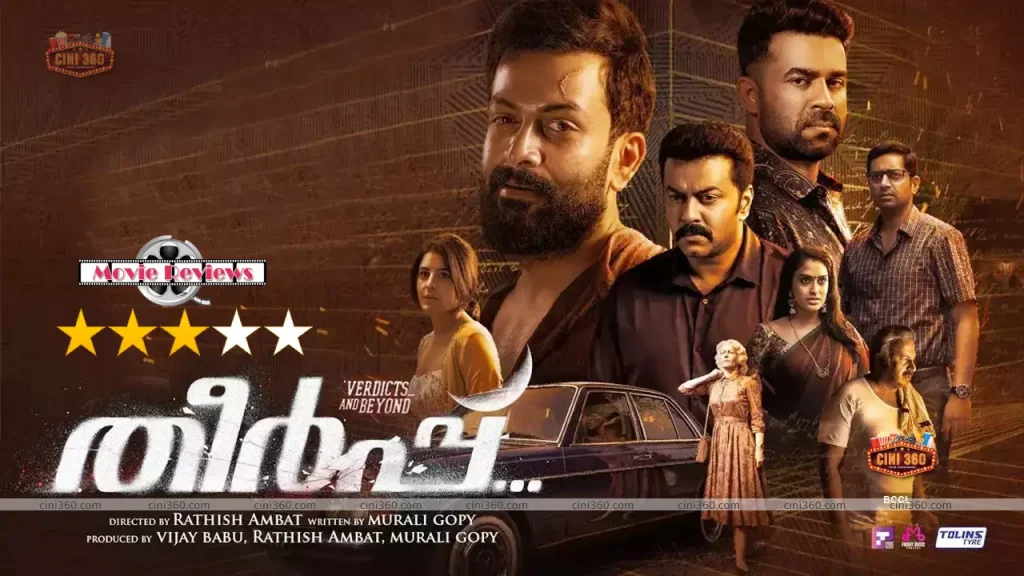Starring: Prithviraj Sukumaran, Indrajith Sukumaran, Isha Talwar, Murali Gopy
Director: Rathish Ambat
Theerppu Rating: 3.1/5
Theerppu is the tale of four childhood friends, whose turbulent relationship is fueled by a betrayal and broken vows from the past.
Murali Gopi appears to be a writer who prefers conceptual novelty to weak plot devices. His use of storytelling archetypes to frequently idealise the human condition in direct correlation with its political identity can be seen throughout his filmography. Theerppu, their second film together after Kammarasambhavam, is a clever parody of the “biopic syndrome” about a bloated traitor who is revered as a political hero in the modern era. It was not a commercial success, but it gained a following online due to its sophisticated satire, imaginative mounting, and creative design. This background information is crucial in the case of Theerppu because the movie echoes the themes contained within the boundaries of the “home invasion drama” subgenre.
Theerppu’s plot is incidental to the fundamental concepts that constitute the story’s central thesis. The movie’s creators have marketed it as an allegory, a type of narrative structure in which the events onscreen are merely meant to serve as a figment of more serious social and political commentary. The problem with using such a plot device in the mainstream, though, is that the execution must be skillful enough for the story to make sense even to viewers who don’t immediately connect with the core ideas that are presented to them at breakneck speed. For a chance at political and ideological engagement from the viewer, the filmmakers must balance being entertaining while avoiding the risk of being condescending towards the less easily initiated member of the audience.
Theerppu is the tale of four childhood friends, whose turbulent relationship is fueled by a betrayal and broken vows from their shared past. The movie begins with Parameshwaran Potty (Saiju Kuruppu) and his wife Prabha (Hannah Reji Koshy) visiting Ram (Vijay Babu) and Mythilli (Isha Talwar) in their recently renovated resort, a place full of artefacts that passes for a sassy art gallery in the middle of nowhere. In order to raise capital for their planned business, Parameshwaran and his wife are hoping to persuade Ram to work with them to pay off their debts and open for business as intended. DIG Kalyan Menon, our fourth friend, is also added.
(Indrajith Sukumaran) as the fourth wheel who is also drawn into the events in the later half.
The third friend, a wandering writer named Abdulla Marakkar (Prithviraj Sukumaran), interrupts the already awkward reunion of the long-estranged friends. By admitting earlier to his bedridden mother that he had mental health problems, Marakkar demonstrated that these problems were a result of accumulated trauma from the past. Giant portraits of Stalin, Gandhi’s spectacles, Che Guevara’s shoulder bag, two unsettling statues of Hitler and Mussolini, as well as a hilarious dash of Amitabh Bachchan, Bruce Lee, and Mohammed Ali are among the stereotypical setups for a typical home invasion thriller that, for the most part, works.
Murali Gopi is skilled at blending established genre elements with frequent historical allusions, thought-provoking literal themes, and other elements while staying within the bounds of commercial cinema that engages and entertains. However, at times the writing feels a little too direct and labored in its attempt to mine novelty. For instance, there are scenes in the second half of the movie where shots are fired at Safdar Hashmi’s pen and Gandhi’s glasses that are on display in the art gallery-like hall, and a character ponders the political ramifications of the shots with a stern expression. With the formality of narrative exposition throws away this kind of ferocious, no holds barred critique on moral blindness, freedom of expression, speech, the rise of propagated hatred, and the gradual upheaval of the right-wing forces, but building on subsequent layers.
Numerous such images and allegoric references to historical events run concurrently with the home invasion in the movie. Ratheesh Ambat enjoys punctuating the excesses in his observations on our political unrest in these morally ambiguous times in human existence. He is self-aware of the complex transgressive nature of the entire exercise. All of the performances are done in broad strokes, with Saiju Kuruppu and Indajith taking some of the funnier lines in the second half. Although the role eventually becomes one-dimensional and becomes a tool for the writer to tell a story, Prithviraj is very effective in it and conveys the inherent craziness and zinger of the vengeful hero. core idea, as a literal, living representation of the helpless pawns cast aside by the system. The women in the film don’t do much other than watch the men fight; they are merely used as stand-ins for the audience to learn the tragic chain of events that led up to the fatal evening. Theerppu is an unadulterated experiment in conceiving an astutely political idea as a film essay, with a top-notch technical team and characters who are self-aware of the high-stakes political commentary done by means of exploitation of commercial cinema conventions.




